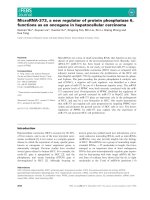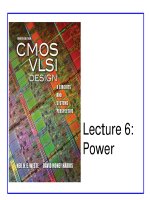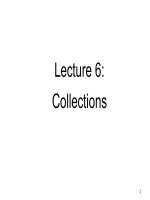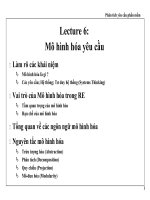Lecture 6 functions
Bạn đang xem bản rút gọn của tài liệu. Xem và tải ngay bản đầy đủ của tài liệu tại đây (1.47 MB, 50 trang )
Ho Chi Minh City University of Technology
Faculty of Computer Science and Engineering
Chapter 6: Functions
Introduction to Computer Programming
(C language)
TS. Võ Thị Ngọc Châu
(,
)
2017 – 2018, Semester 2
Course Content
C.1. Introduction to Computers and
Programming
C.2. C Program Structure and its
Components
C.3. Variables and Basic Data Types
C.4. Selection Statements
C.5. Repetition Statements
C.6. Functions
C.7. Arrays
C.8. Pointers
C.9. File Processing
2
References
[1] “C: How to Program”, 7th Ed. – Paul
Deitel and Harvey Deitel, Prentice Hall, 2012.
[2] “The C Programming Language”, 2nd Ed.
– Brian W. Kernighan and Dennis M. Ritchie,
Prentice Hall, 1988
and others, especially those on the Internet
3
Content
Introduction
Functions
An
in the standard library
example of a function
Components
Function
of a function
call
Recursion
Summary
4
Introduction
In the previous chapters, we have used
several so-called functions in the library:
printf in stdio.h
scanf in stdio.h
fflush in stdio.h
sqrt in math.h
Those functions are modular
processing units that are:
Responsible for a
certain task
pow in math.h
system in stdlib.h
Reusable in many
strcmp in string.h
various programs
strcpy in string.h
5
Functions in the standard library
<assert.h>
<locale.h>
<stddef.h>
<ctype.h>
<math.h>
<stdio.h>
<errno.h>
<setjmp.h>
<stdlib.h>
<float.h>
<signal.h>
<string.h>
<limits.h>
<stdarg.h>
<time.h>
Source: www.tutorialspoint.com
6
Functions in the standard library
Some functions in <stdio.h>
int printf(const char *format, ...)
int scanf(const char *format, ...)
Reads formatted input from stdin
int getchar(void)
Sends formatted output to stdout
Gets a character (an unsigned char) from stdin
char *gets(char *str)
Reads a line from stdin and stores it into the string pointed
to, by str. It stops when either the newline character („\n‟)
is read or when the end-of-file (EOF) is reached, whichever
comes first.
7
Functions in the standard library
Some functions in <math.h>
double cos(double x)
double pow(double x, double y)
Returns the square root of x
double ceil(double x)
Returns x raised to the power of y
double sqrt(double x)
Returns the cosine of a radian angle x
Returns the smallest integer value greater than or equal
to x
double floor(double x)
Returns the largest integer value less than or equal to x
8
Functions in the standard library
Some functions in <stdlib.h>
void *malloc(size_t size)
void free(void *ptr)
Deallocates the memory previously allocated by a call to
calloc, malloc, or realloc
int rand(void)
Allocates the requested memory and returns a pointer to it
Returns a pseudo-random number in the range of 0 to
RAND_MAX (at least 32767, up to implementation)
int system(const char *string)
The command specified by string is passed to the host
environment to be executed by the command processor
E.g. “pause”, “cls”, “date”
9
Introduction
Repeated code!!!
Can we just code
them once and then
make use of them
over the time just
like those in the
standard library?
10
Introductions
Let‟s define a function: getNaturalNumber()
Declared in a header file
C6_function_getNaturalNumber_1.h
for multiple uses
Source code file: C6_function_getNaturalNumber.c
Purpose: to ask users to input a natural number
until a valid number is input
11
Use of our previously defined
function, which is declared in
a header file:
“C6_function_getNaturalNumber_1.h”
Compile:
gcc C6_starTriangle_function_1.c C6_function_getNaturalNumber.c
–o C6_starTriangle_function_1.exe
12
Introduction
A function
A processing unit to perform a specific task
A means to modularize a program for
manageable program development
C Program 1
main()
function1()
C Program 2
main()
function1()
function2()
function3()
…
…
Divide-and-conquer
Reusable
Information hiding
Abstraction
Easy for debugging
13
Introduction
Issues related to functions
Function definition
Function declaration
Function call
14
An example of a function
Prepare your own library for numbers
Compute the sum of N first natural numbers
Compute the factorial of N, a natural number
xn = x*x*x*…*x
Count the number of digits in N, a natural number
factorial = 1*2*3*…*(N-1)*N
Compute the n-th power of x, a floating-point
number
sum = 1 + 2 + 3 + … + (N-1) + N
N = 123456
=> Number of digits = 6
Round x, a floating-point number, with two digits
after the decimal point
x = 1.23456
x = 9.87654321
=> x = 1.23
=> x = 9.88
15
An example of a function
Prepare your own library for numbers
Check if a natural number is a prime number
7 => true (0)
8 => false (0)
Check if a natural number is a squared number
4 => true (0)
8 => false (0)
Toggle non-zero digits to „9‟ digits in an integer number to
generate its 9-based mask
113789 => 999999
-10789 => -90999
Count the number of occurrences of each digit in an integer
number
113789 => 0: 0; 1: 2; 2: 0; 3: 1; 4: 0; 5: 0; 6: 0; 7: 1; 8: 1; 9: 1
-20054 => 0: 2; 1: 1; 2: 1; 3: 0; 4: 1; 5: 1; 6: 0; 7: 0; 8: 0; 9: 0
An example of a function
Prepare your own library for numbers
Estimate a value of e, the natural number
Estimate a value of ex
Estimate a value of PI
…
17
Components of a function
Given N, a natural number, calculate the
factorial of N: N! = 1*2*..*N = (N-1)!*N
18
Components of a function
Given N, a natural number, calculate the
factorial of N: N! = 1*2*..*N = (N-1)!*N
Return
type
which is
a data
type of
the value
returned
Function
name
Parameter list
with comma
separation.
No default
value for each
parameter in C
functions.
return statement to return a
value of a return type to the caller
Function
body that
includes
declarations
and
statements
performed
for a
specific task
19
Components of a function
[static] return-type function-name (argument-declarations)
{
declarations and statements
}
- function-name: a valid identifier
- argument-declarations: a list of formal parameters in communication
Part
of the
input
Process
ing in
its
body
+ Each parameter is regarded as a local variable with a data type.
+ Each parameter can be specified with “const” for unchanged intention.
+ Each parameter can be passed by value or by reference if it is a pointer.
- declarations: a list of local variables
+ Each variable can be auto or static with one single initialization.
- statements: zero, one, or many statements of any kind
- return-type: a valid data type or void
Part
of the
output
Charac
teristic
+ Statement return [<expression>]; in the body is used to end the
called function and return [a value] to its caller. If not, close brace of the
body ends the called function and program control is switched to its caller.
- [static]: optional specification to make the function available only in the file
where it is defined.
20
Concepts related to functions
Function definition:
[static] return-type function-name (argument-declarations)
{
declarations and statements
}
Function prototype:
return-type function-name (argument-declarations);
Function signature:
[extern] return-type function-name (argument-declarations)
No concept of “nested functions”!
Implementation-dependent
21
Where is a function defined and
declared?
A function definition can be placed in:
the same file where the main() function is
Before the main() function
After the main() function
a separated file where the main() function is not
Regardless of where a function is defined, its
declaration is required before any call to it.
Function prototype in the global declaration section
Function prototype in a header file for common use
22
A program for an approximation
of the x-th power of e
Function definition
= Function declaration
(as it is placed before its call)
Function declaration
a call to a function
Function definition
(a function declaration is required
as it is placed after its call.)
23
Where is a function defined and
declared?
SEPARATED FILES
Function declaration
Function
definition
Function calls
24
Where is a function defined and
declared?
Source file
getFactorial.c
25









